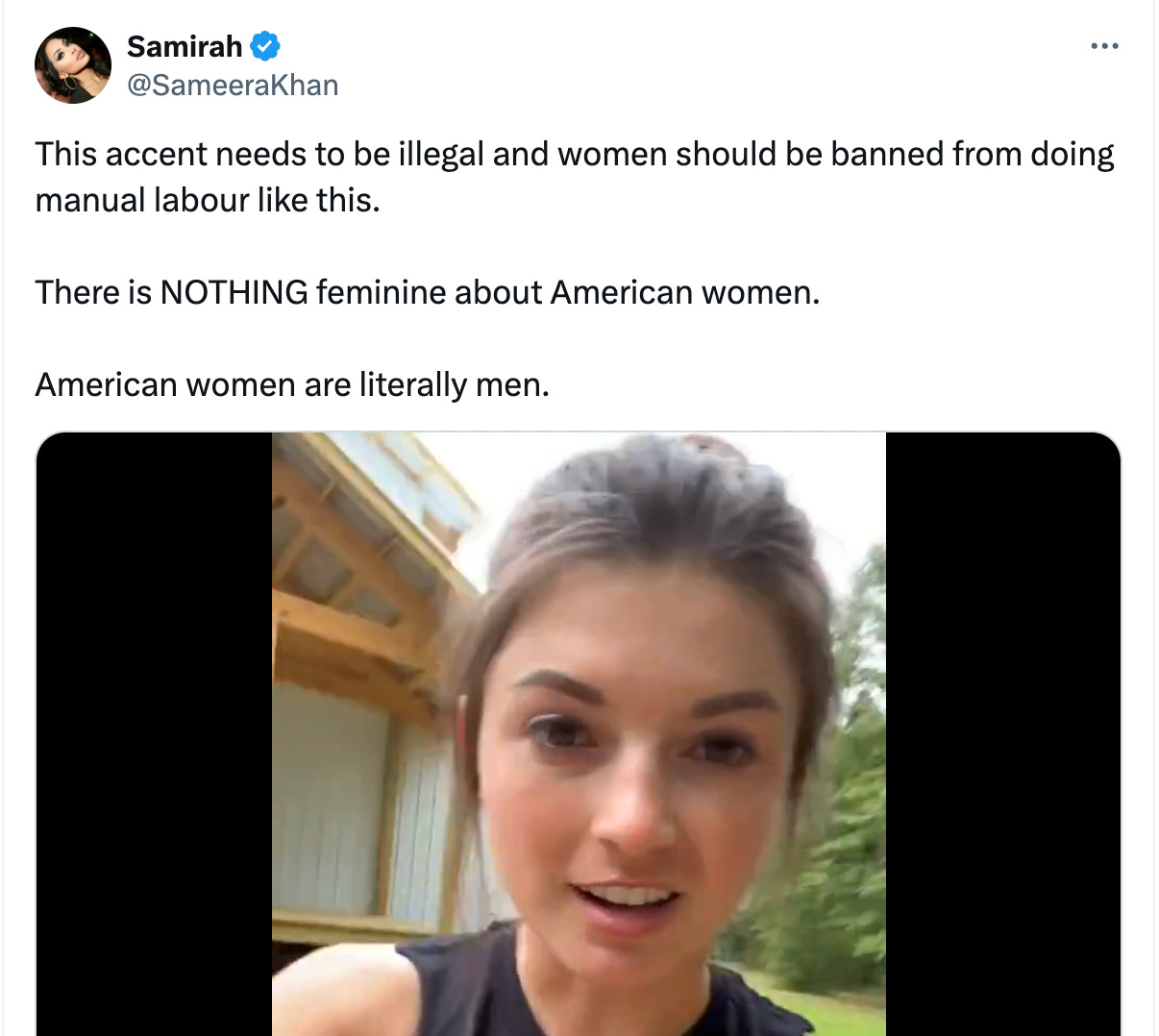The Rural Grace Of Hannah Barron
The Cheerful Alabama Tomboy Is Part Of What's Right With America
And how was your weekend? I hung out for about an hour and a half on Saturday with Linda Arnold, a member of the community of this newsletter. It was great! She allowed me to interview her about her life-changing trip to Sarajevo and Medjugorje. I’m going to run it through transcription software, let her see it to make sure she didn’t inadvertently say something she doesn’t want to be public, then post it here. What an interesting life Linda has, and has led. I can’t wait to share her words with you.
Let’s get to it, shall we? At the top of my list today is the tempest-in-a-Twitter-pot that was a post by a gorgeous Lebanese lady who, if she’s not just throwing bombs to click-farm, is more than a little full of herself:
She’s beautiful on the outside, but inside? Well, you have to click on this link to go to the tweet to listen to this clip:
The “man” below is a Southern tomboy named Hannah Barron, from Crenshaw County, Alabama. She has a thick Southern accent and a big following on social media for her videos about hunting and fishing. I had never heard of her before Samirah attacked her, and it went viral on Twitter, but I’m thrilled by it because the bitchy shade Samirah through has no doubt brought Barron lots more subscribers.
Hannah Barron responded here, showing more inner strength and aw-shucks grace than the arch-feline Samirah could ever hope to muster. It’s just masterful and winning, and I urge you to watch it. This gal is a Steel Magnolia if ever there was one. Here’s a link to her YouTube channel. When I watch these clips, I feel like I’m back at home. The accent is noticeably different from the one I grew up with, but everything else is right on target.
Hannah Barron is old enough to have been the daughter of my late sister Ruthie Leming, and is a lot more like Ruthie than any of Ruthie’s three daughters are. This not a criticism, of course — certainly not coming from Ruthie’s citified older brother — but just a recognition that there are a lot of women like this throughout rural America. Ruthie was a less exuberant, less extroverted version of Hannah Barron, but watching these HB clips makes me realize that this is the first time in a long time, and maybe ever, that I’ve seen my sister’s kind of femininity portrayed in media.
As I wrote in The Little Way Of Ruthie Leming, my book about her, my sister was a natural-born country girl. Excerpts:
Ruthie was always a fighter. Paw remembers driving up to the campus of the elementary school where Ruthie had just started first grade. He was headed there on business, but was shocked to see a much older and bigger girl had Ruthie by the hair, dragging her down.
“I stopped the truck and ran over to break it up,” he says. “Ruthie was crying, I mean really sobbing, but she was whaling on that big girl as hard as she could. She was scared to death, but she was fighting. She wouldn’t quit.”
After we were both in school, our mother took up driving a school bus. The drivers would line up outside the elementary school in the afternoon, chatting with each other until the final bell rang, letting the kids out.
“One day, Ruthie was probably third grade, I remember Clyde Morgan, one of the other drivers, sitting there with us saying, ‘That boy better watch out.’” Mam remembers. “Your sister was coming across the way to the bus, with her lunch box in one hand, and her book sack in the other. This little boy kept running by her, hitting her on the head. We watched her weigh the booksack in one hand, and the lunchbox in the other. Clyde said, ‘Look, she’s choosing her weapon.’ She picked up that booksack, and when he made the next round, she whacked him with the booksack, knocked that boy on the ground. Calmly picked up her booksack and got on the bus. Never said another word about it.”
More:
She was a tomboy’s tomboy. When Ruthie was in fifth grade, Paw showed her how to shoot marbles. She would take her taw, which is the big marble, and six small marbles to school with her every morning. While the girls in her class busied themselves playing girly games at recess, Ruthie hunkered down on the playground to shoot marbles with the boys.
“She won so many marbles doing that, that I had to sew a sack for her about two feet long to hold them all,” Mam said. “She was very kind, but Lord, she was competitive.”
Ruthie was a hard little nut. But if that was all she was, she wouldn’t have had so many friends. The truth is, Ruthie had no enemies. She was one of those rare people who had a natural talent for nurturing friendships with both boys and girls. And though sports, hunting, and fishing were her passions, she could be as feminine as she needed to be when the occasion called for it. Ruthie was probably our town’s only homecoming queen who really did know how to skin a buck and run a trot line.
That last line is a nod to “A Country Boy Can Survive,” one of the greatest hits of Hank Williams Jr., Ruthie’s favorite country singer. After Hank played Baton Rouge back in the 1980s, local folks were buzzing about some ol’ gal who had taken off her brassiere and thrown it onstage; Hank hung it from his guitar neck.
That was, of course, Ruthie.
Thing is, Ruthie was not masculine; hers was a femininity you see in country girls down South. She was really pretty, and crazy about boys (she married one of the most handsome guys in her high school class). But that girl was tough. Once she had a burst ectopic pregnancy, which was the source of her abdominal pain. She endured two days of a stabbing ache before going to the doctor. Thank God she did, because if she had waited much longer, she probably would have died. Docs could not believe that she stood up at all through that pain, much less taught math and science to a classroom full of sixth-graders, for two days. But that’s just how she was.
I didn’t understand her when I was younger, but as I grew older (and grew older away from our West Feliciana Parish home), I came to appreciate her way of seeing the world a lot more. It wasn’t mine, but damn, that girl could do just about anything. She loved hunting and fishing, and everything about country life. After she was diagnosed with terminal cancer at age 40, my admiration of her turned into something like awe when I saw how she dealt with it, and I also saw the passionately devoted community that my country-girl sister had built around her.
You all know the tragic story of what happened after I moved to Louisiana following her death, so I won’t repeat it here. Watching Hannah Barron’s brilliant and graceful response to Samirah’s condescension helped me understand what Hannah has that Ruthie did not: an easygoing ability to not give a damn about what outsiders think. Ruthie did care. She, like our father whom she so closely resembled, took my failure to be like them as a rebuke and a judgment. Ruthie’s widower husband told me that she just couldn’t understand why I would want to move away. That stereotypical suspicion of city slicks ended up leading to the destruction of our family, as you know.
I’ve met people over the years who read Little Way and can’t understand why I still have so much admiration and affection for my sister, despite what I now know, and what I had to endure as the result of the rejection she and my father brought about. Well, watch Hannah Barron, and you’ll have a clue. I cherish women who are unabashedly at home in the country, doing country things, and who don’t get caught up in what Ruthie would have called “stupid girl shit” — meaning the kind of intriguing and emotional game-playing that exemplify the feminine spirit at its worst. Ruthie didn’t roll that way. I think it’s one reason she had so many male friends. I remember when we were kids, being present when the hunters were skinning a deer. Ruthie was right up in the middle of it, observing, learning how to do it herself, and marveling at the biology of the animal. Like our father, she had a very curious mind, and taught herself all she could about the animals she hunted and the fish she caught. And like our father, she nurtured some resentment against people who did not share those passions. Or at least me, because I was her flesh and blood, and was supposed to.
I guess I instantly loved Hannah Barron because she reminds me of Ruthie without the dark streak. Had Samirah made those bitchy remarks about Ruthie, she would have balled up her fists, at least inwardly, and dwelled on that cheap insult for a long time. Hannah Barron just tossed it aside, with apparent genuineness — and, to be honest, with more grace than I could muster on her behalf. Samirah’s insult put me in touch with my inner Bocephus, and uncorked, just a bit, the geyser of White Rural Rage that we’re hearing so much about from our left-wing coastal friends these days.
What are Hannah Barron’s politics? I don’t know, but I would guess that she’s a Trump voter, but doesn’t take politics seriously at all. If I were guessing, I would predict that she has no particular admiration or even affection for Trump, but she would vote for him because he doesn’t seem to hate her people. But it’s also the case that if you were broken down on the side of the road in a car whose bumper was covered with Biden and Hillary and Obama stickers, and MAGA-hating too, she would not hesitate to pull over and help you. The idea that you should pass by somebody in need because of their politics would be foreign to her, and even repulsive.
Do I know this for sure? Of course not. But I grew up around Hannah Barrons, and their mamas and daddies. In the United States, the Left thinks it understands “white rural rage,” and in their condescension and mockery, only stoke what they claim to hate. But what these coastal haters don’t see — but that the Blue-Dot-In-A-Red-State liberals usually do understand, to their credit — is white rural grace.
Hannah Barron is too graceful to say this, but I don’t have her gifts, so let me appropriate a line from Hank Williams Jr. and say, as no doubt my sister Ruthie would have done: If you don’t like Hannah Barron, you can kiss my ass.
Keep reading with a 7-day free trial
Subscribe to Rod Dreher's Diary to keep reading this post and get 7 days of free access to the full post archives.






